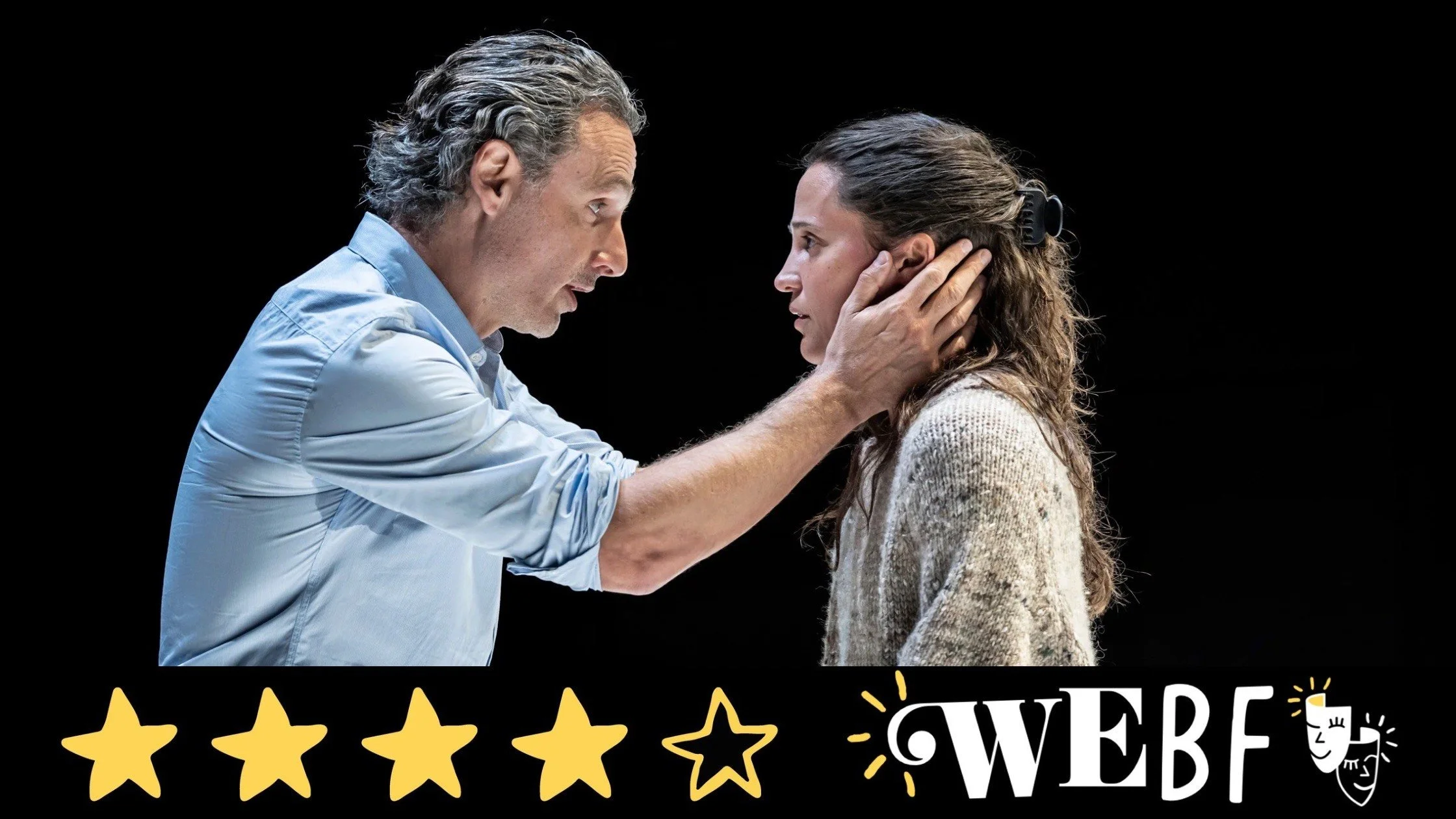Review: THE LADY FROM THE SEA, Bridge Theatre
Photo credit: Johan Persson
The Lady From The Sea is the latest modern reinterpretation from boundary-pushing writer and director Simon Stone. Having garnered praise from both critics and audiences alike for his previous depictions of Yerma at the Young Vic and Phaedra at the National Theatre, Stone is no stranger to stripping a classical piece back to its basics and building a fresh new world upon its foundations. His process in tackling Henrik Ibsen’s The Lady From The Sea at the Bridge Theatre is no different, and while he may have die-hard Ibsen fans feeling a little bewildered by his modern retelling, Stone doesn’t hold back in showing us an unconforming version of events.
Discussion around the play has been driven by heavy hitters Alicia Vikander and Andrew Lincoln, who are at the helm of the production in the principal roles of Ellida and Edward. This A-list billing will no doubt bring in a whole new generation of theatregoers, delighted to see a relatable rendition of the play they’re ardently studying at school. Stone’s modernisation is spearheaded by his dialogue, with mentions of Instagram, TikTok, and even Brooklyn Beckham solidifying the world within this story is being told. Despite this, Ibsen’s original motifs are still at the heart of the play: love, loss, desire and freedom. We see a middle-class family, somewhat stifled by their own privilege, start to unravel as the female character's needs and desires are brought to the forefront.
There have been some alterations, but the story's premise remains intact. Ellida and Edward’s seemingly idyllic marriage is called into question when Elida’s past catches up to her in the form of a previous lover Finn Marcet (played by Brendan Cowell). Finn brings Ellida unresolved trauma as well as the premise of “what if?”, and Cowell unnervingly injects an element of trepidation into the mix. Their history serves as a commentary on coercion and consent, whilst also highlighting Ellida’s subconscious yearning for a father figure in her life, which has even extended to her relationship with Edward. Mel Page’s costume design complements Vikander’s slight frame, particularly when dressing her in oversized jumpers and sundresses to give her a childlike vulnerability during scenes where she confronts her lost innocence and youth.
The play relies heavily on Ellida’s recounting of events and delivery of revelations, and Vikander is tasked with conveying vast amounts of information through sprawling monologues. Although full of emotion and successful in raising the stakes, at times, we feel a little lost and unable to keep up with the pace of her speeches, running the risk of losing vital details which move the plot forward. Joe Alwyn’s character, Heath, although serving as an outside and, at times, triggering perspective for the characters, also feels somewhat disjointed in Stone’s adaptation. However, Alwyn’s portrayal is enough to pique our interest in the young theatrical sculptor’s own trials and tribulations, even if his modernised connection to the family isn’t entirely clear.
Although the main point of contention is the return of Finn, the play offers many points of discussion with conversations about race and wealth bubbling under the surface throughout.
The character of Lyle (John Macmillan) is a steadfast companion to the family, whilst providing intelligent commentary on the play’s undercurrent themes. Macmillan is both an anchor within the family’s emotional turmoil and a source of comic relief, thanks to his endearing, perceptive portrayal.
Edward’s teenage daughters, Asa (Gracie Oddie-James) and Hilda (Isobel Akuwudike), give convincing performances as young women wanting to flee the nest, whilst still navigating the loss of their biological mother. Gracie Oddie-James has a particularly charming stage presence as she delivers hefty blows of sarcasm and self-awareness while her father desperately tries to deny his daughter's independence. Stone strikes the balance perfectly, as we’d start to resent their heightened, bratty behaviour if the script didn’t consistently remind us that these women are intelligent, witty, and ambitious—deserving of the opportunity to carve out a life of their own choosing. The exploration of female roles in relation to the men in their lives is pivotal to the characters' development, particularly Edward, who is forced to grapple with the possibility of being abandoned by both his daughters and his wife.
Aside from Lincoln’s standout performance as a grounded family man slowly reaching his emotional breaking point, it’s Lizzie Clachan’s set design which really makes this piece a must-see. From rainstorms to swimming pools, the stage is transformed seamlessly, and the use of water is as metaphorical as it is functional, particularly during the climactic reunion scene between Ellida and Finn. The rainwater reaches ankle height, and they begin to undress each other, writhing around in a shallow pool centre stage while Edward agonises over his wife’s whereabouts - all three drenched by the downpour. It’s a joy to see The Bridge Theatre space once again utilised to its full potential.
Although Stone’s modernisation and his delivery of character backstory are occasionally a little clunky, The Lady From The Sea is a bold adaptation successfully designed to spark new conversation around a traditional classic.
**** Four stars
Reviewed by: Chess Hayden
The Lady From The Sea plays at The Bridge Theatre until 8 November, with tickets available here.


